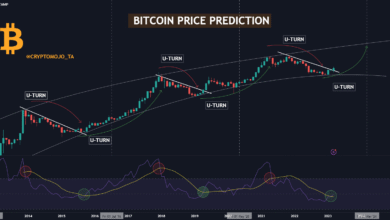Dirham Cryptocurrency Conversion: Mbank’s New Service

Dirham cryptocurrency conversion is revolutionizing the financial landscape in the UAE, driven by the recent partnership between Mbank and Changer.ae. With the blessing of the UAE Central Bank, this innovative service allows users to seamlessly convert AED to digital assets and stablecoins like USDT and USDC, promoting secure cryptocurrency transactions. Utilizing a fully regulated AED escrow account, Mbank ensures that these exchanges are compliant and efficient, bolstering trust in virtual asset dealings. CEO Mohammed Wassim Khayata emphasizes the importance of transparency and speed, making it easier for customers to manage their cryptocurrencies confidently. This move not only streamlines the conversion process but also marks a pivotal moment for the UAE as it positions itself at the forefront of the global cryptocurrency frontier.
The launch of a cryptocurrency exchange service pegged to the Dirham is set to transform how digital assets are managed in the UAE. Mbank’s collaboration with Changer.ae is a forward-thinking approach that addresses the growing demand for secure and compliant channels for exchanging traditional currency, such as the UAE Dirham (AED), with virtual currencies. By leveraging an AED escrow account, this initiative assures users of safe transactions and access to various stablecoins, reflecting the region’s commitment to embracing the digital economy. As Mbank forges ahead with this service, it distinctly enhances the usability of cryptocurrencies while reinforcing UAE’s strategy to establish itself as a leading hub for fintech innovation. This dynamic shift not only caters to existing crypto enthusiasts but also opens the door for new users looking to explore the advantages of digital finance.
Understanding Dirham Cryptocurrency Conversion
Dirham cryptocurrency conversion is a pivotal development in the UAE’s burgeoning financial landscape, driven by the recent partnership between Mbank and Changer.ae. This service enables users to convert the UAE Dirham (AED) into various digital assets and stablecoins like USDT and USDC seamlessly. The approval from the UAE Central Bank to establish a fully regulated AED escrow account marks a significant leap towards secure cryptocurrency transactions, providing the necessary regulatory framework that enhances the trustworthiness of the involved operations.
With this service, users can not only convert AED to cryptocurrencies but also benefit from the transparency and speed provided by the escrow account. This ensures a secure medium for transactions, mitigating risks often associated with cryptocurrency usage. Mbank’s initiative exemplifies the UAE’s commitment to integrating blockchain technology within its financial services, positioning the nation as a leader in the global cryptocurrency market.
The Role of Mbank in Promoting Cryptocurrency in UAE
Mbank is positioned at the forefront of cryptocurrency advancement in the UAE, spearheaded by its recent collaboration with Changer.ae. This partnership is a part of Mbank’s strategic initiative to cater to the growing demand for digital currency solutions within the Emirates. By establishing a direct conversion service for Dirham cryptocurrency, Mbank aims to simplify access for users, allowing them to navigate between fiat and digital currencies with ease, which is crucial in a rapidly evolving financial ecosystem.
Furthermore, Mbank’s emphasis on secure cryptocurrency transactions ensures that customers can rest assured that their funds and personal information are handled with utmost care. This creates an environment conducive to innovation and encourages more participants to engage with the cryptocurrency market. Mbank is not just facilitating access to digital assets; they are setting a standard for security and reliability in the region’s financial practices.
Enhancing Security with AED Escrow Account
One of the cornerstones of Mbank’s cryptocurrency conversion service is the establishment of a regulated AED escrow account. This escrow account acts as a custodian for the funds during transactions, ensuring a layer of security that is essential for both individual users and businesses engaging in cryptocurrency. The significant regulatory oversight provided by the UAE Central Bank reinforces confidence in this financial service, addressing concerns surrounding security and compliance within the cryptocurrency sphere.
By utilizing an escrow account, Mbank not only complies with local regulations but also protects its customers from potential fraud and volatility often associated with direct cryptocurrency transactions. This level of security is crucial for maintaining user trust and promoting wider adoption of digital currency solutions in the UAE, paving the way for a more integrated and reliable financial future.
Stablecoins and Their Impact on Transactions
Stablecoins, such as USDT and USDC, play a vital role in cryptocurrency transactions, especially within the context of the new service launched by Mbank and Changer.ae. By enabling conversions to these stable digital assets, users can protect themselves against the inherent volatility of cryptocurrencies, providing a stable medium for transactions within a secure cryptocurrency framework. This feature is particularly appealing to local businesses and investors looking to utilize digital currencies without exposing themselves to excessive market risks.
The introduction of stablecoin options aligns with Mbank’s goal to enhance the overall transaction capabilities for users in the UAE. With the backing of a regulated AED escrow account, customers can confidently engage in cryptocurrency transactions knowing that they are operating within a secure environment. This not only fosters a sense of security but also encourages more extensive involvement in the cryptocurrency space, supporting the UAE’s vision of becoming a global hub for digital finance.
Advantages of Mbank Changer Partnership
The partnership between Mbank and Changer.ae is a significant milestone for the UAE’s cryptocurrency infrastructure, offering numerous advantages to users. With integrated services that facilitate Dirham cryptocurrency conversion, customers can now access a streamlined process for exchanging fiat currency and digital assets. This strategic collaboration not only enhances operational efficiencies but also caters to the growing demand for accessible and compliant cryptocurrency solutions in the region.
Moreover, the partnership allows both companies to leverage each other’s strengths, providing customers with a robust platform for secure transactions. Changer.ae’s experience in managing cryptocurrency exchanges complements Mbank’s banking expertise, resulting in a unique synergy that promotes rapid adoption of digital currencies among UAE residents. Users can benefit from improved transaction times and lower fees, making this service an attractive avenue for anyone interested in engaging with digital assets.
The Future of Cryptocurrency in the UAE
The future of cryptocurrency in the UAE looks promising, particularly with the recent initiatives taken by financial institutions like Mbank. As the UAE Central Bank continues to support innovations within the cryptocurrency sector, the groundwork is being laid for further growth and development. The introduction of the AED escrow account and the partnership with Changer.ae are critical elements in establishing a safe and regulated environment for digital currencies in the region.
Moreover, as more users gain access to secure cryptocurrency transactions and the ability to convert Dirham into various digital assets, it’s expected that the UAE will see a significant increase in the adoption of cryptocurrencies. As the country positions itself to become a central hub for virtual assets, Mbank and other financial institutions are paving the way for future innovations that could redefine digital finance in the Middle East.
Implications of Regulations on Cryptocurrency Transactions
Regulatory frameworks play a crucial role in shaping the cryptocurrency landscape in the UAE. Mbank’s establishment of a regulated AED escrow account is a testament to the positive impact of government oversight on the development of secure cryptocurrency transactions. These regulations provide a necessary layer of consumer protection while fostering an environment conducive to innovation within the financial sector.
Furthermore, compliance with these regulations empowers traditional financial institutions to engage more closely with new technologies, paving the way for developments that could enhance the overall user experience. As a result, we may witness an increase in partnerships and collaborations within the cryptocurrency industry, allowing for seamless conversions between fiat currencies and digital assets, aligning with the UAE’s ambition to become a global hub for cryptocurrency.
User Experience with Cryptocurrency Conversion Services
User experience is paramount when it comes to cryptocurrency conversion services, particularly in the context of the new offering from Mbank and Changer.ae. The streamlined process allows users to easily convert Dirham into various cryptocurrencies or stablecoins while ensuring speed, transparency, and security. The clear navigation and instant conversion capabilities cater to both seasoned investors and newcomers to the cryptocurrency market.
Additionally, Mbank’s initiative to integrate the Jaywan ATM card for cash withdrawals further enhances user experience. Customers can enjoy quick access to converted funds, allowing them to utilize their digital assets for everyday transactions without hassle. This focus on user-friendly service not only simplifies the conversion process but encourages more individuals to explore the potential of cryptocurrencies.
Technical Innovations Supporting Cryptocurrency Use
The technical innovations implemented by Mbank in collaboration with Changer.ae are crucial for supporting cryptocurrency use in the UAE. With cutting-edge technology, Mbank aims to provide a robust platform that guarantees secure cryptocurrency transactions. Implementing high-level encryption and secure payment gateways ensures that customers’ data and funds are protected during exchanges.
Moreover, Mbank’s systems are designed to minimize transaction times, promoting a frictionless experience for customers engaged in Dirham cryptocurrency conversion. Innovative technological solutions enhance the overall reliability of the service, reflecting the bank’s commitment to establishing a conducive environment for cryptocurrency activities—ultimately transforming the UAE into a leading financial hub.
Frequently Asked Questions
What is the Dirham cryptocurrency conversion service launched by Mbank and Changer.ae?
The Dirham cryptocurrency conversion service is a collaboration between UAE’s Mbank and Changer.ae that allows users to convert Dirham-based cryptocurrencies securely and compliant with regulations. This service facilitates conversions between AED and various virtual assets, including stablecoins like USDT and USDC, enhancing transaction capabilities for users in the UAE.
How does the AED escrow account enhance Dirham cryptocurrency conversion?
The AED escrow account established by Mbank provides a secure and fully regulated framework for Dirham cryptocurrency conversion. It ensures that all transactions are compliant with UAE regulations, protecting users’ interests while facilitating fast and transparent conversions between AED and virtual assets.
What types of cryptocurrencies can be converted using the Dirham cryptocurrency conversion service?
Using the Dirham cryptocurrency conversion service, users can convert AED into various virtual assets, particularly stablecoins like USDT and USDC, providing diverse transaction options within the UAE cryptocurrency market.
Why is secure cryptocurrency transactions important for the Dirham conversion service?
Secure cryptocurrency transactions are crucial for the Dirham conversion service to protect user funds and ensure compliance with regulatory standards. The collaboration between Mbank and Changer.ae emphasizes security, allowing customers to convert their assets with confidence in a regulated environment.
How can customers use the converted AED from Dirham cryptocurrency transactions?
Customers can use the converted AED from Dirham cryptocurrency transactions for various purposes, such as making purchases or cash withdrawals using the Jaywan ATM card. This flexibility enhances user experience and integrates cryptocurrencies into everyday financial activities.
What role does the partnership between Mbank and Changer.ae play in the UAE’s cryptocurrency landscape?
The partnership between Mbank and Changer.ae represents a significant advancement in the UAE’s cryptocurrency landscape, reinforcing the country’s ambition to become a global cryptocurrency hub. By offering regulated Dirham cryptocurrency conversion services, they enhance the security and efficiency of cryptocurrency transactions in the region.
What advantages does Mbank’s CEO highlight about the new Dirham cryptocurrency conversion service?
Mbank’s CEO, Mohammed Wassim Khayata, highlights the advantages of fast, transparent, and secure conversions in the Dirham cryptocurrency conversion service. He emphasizes the importance of the AED escrow account in reinforcing Mbank’s commitment to innovation and regulatory compliance in the UAE’s financial ecosystem.
Can I withdraw cash from my cryptocurrency conversions in AED directly?
Yes, after converting cryptocurrencies using the Dirham conversion service, users can withdraw cash in AED directly from their accounts using the Jaywan ATM card, making it easier to access funds.
| Key Point | Details |
|---|---|
| Partnership Announcement | UAE’s Mbank has partnered with Changer.ae. |
| Central Bank Approval | UAE Central Bank approved the opening of a regulated AED escrow account. |
| Service Objective | To provide secure conversions between AED and virtual assets. |
| Supported Assets | Includes stablecoins like USDT and USDC. |
| Customer Benefits | Offers fast, transparent, and secure cryptocurrency conversion to AED. |
| ATM Usage | Converted AED can be used for transactions or cash withdrawals with the Jaywan ATM card. |
| Significance | This initiative aims to enhance the UAE’s position as a global cryptocurrency hub. |
Summary
Dirham cryptocurrency conversion has become a significant action of Mbank in collaboration with Changer.ae, following the authorization from the UAE Central Bank to establish a regulated AED escrow account. This innovative service will allow users to convert their dirhams to cryptocurrencies securely, catering to the growing demand for virtual transactions while ensuring compliance with financial regulations. The partnership marks a crucial milestone in the UAE’s aspiration to promote itself as a leading cryptocurrency hub.




